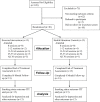Supervised, Vigorous Intensity Exercise Intervention for Depressed Female Smokers: A Pilot Study
- PMID: 27613946
- PMCID: PMC5157716
- DOI: 10.1093/ntr/ntw208
Supervised, Vigorous Intensity Exercise Intervention for Depressed Female Smokers: A Pilot Study
Abstract
Introduction: Few studies have evaluated exercise interventions for smokers with depression or other psychiatric comorbidities. This pilot study evaluated the potential role of supervised vigorous exercise as a smoking cessation intervention for depressed females.
Methods: Thirty adult women with moderate-severe depressive symptoms were enrolled and randomly assigned to 12 weeks of thrice weekly, in person sessions of vigorous intensity supervised exercise at a YMCA setting (EX; n = 15) or health education (HE; n = 15). All participants received behavioral smoking cessation counseling and nicotine patch therapy. Assessments were done in person at baseline, at the end of 12 weeks of treatment, and at 6 months post-target quit date. Primary end points were exercise adherence (proportion of 36 sessions attended) and biochemically confirmed 7-day point prevalence abstinence at Week 12. Biomarkers of inflammation were explored for differences between treatment groups and between women who smoked and those abstinent at Week 12.
Results: Treatment adherence was high for both groups (72% for EX and 66% for HE; p = .55). The Week 12 smoking abstinence rate was higher for EX than HE (11/15 [73%] vs. 5/15 [33%]; p = .028), but no significant differences emerged at 6-month follow-up. Interleukin-6 levels increased more for those smoking than women abstinent at Week 12 (p = .040).
Conclusions: Vigorous intensity supervised exercise is feasible and enhances short-term smoking cessation among depressed female smokers. Innovative and cost-effective strategies to bolster long-term exercise adherence and smoking cessation need evaluation in this population. Inflammatory biomarkers could be examined in future research as mediators of treatment efficacy.
Implications: This preliminary study found that vigorous intensity supervised exercise is feasible and enhances short-term smoking cessation among depressed female smokers. This research addressed an important gap in the field. Despite decades of research examining exercise interventions for smoking cessation, few studies were done among depressed smokers or those with comorbid psychiatric disorders. A novel finding was increases in levels of a pro-inflammatory biomarker observed among women who smoked at the end of the intervention compared to those who did not.
© The Author 2016. Published by Oxford University Press on behalf of the Society for Research on Nicotine and Tobacco. All rights reserved. For permissions, please e-mail: journals.permissions@oup.com.
Figures



References
-
- Centers for Disease Control and Prevention. Current cigarette smoking among adults—United States, 2005–2014. MMWR Morb Mortal Wkly Rep. 2015;64(44):1233–1240. - PubMed
-
- Scharf D, Shiffman S. Are there gender differences in smoking cessation, with and without bupropion? Pooled- and meta-analyses of clinical trials of Bupropion SR. Addiction. 2004;99(11):1462–1469. doi:10.1111/j.1360-0443.2004.00845.x. - PubMed
-
- Perkins KA. Smoking cessation in women. Special considerations. CNS Drugs. 2001;15(5):391–411. - PubMed
-
- Schnoll RA, Patterson F, Lerman C. Treating tobacco dependence in women. J Womens Health (Larchmt). 2007;16(8):1211–1218. - PubMed
Publication types
MeSH terms
Grants and funding
LinkOut - more resources
Full Text Sources
Other Literature Sources
Medical
Miscellaneous

